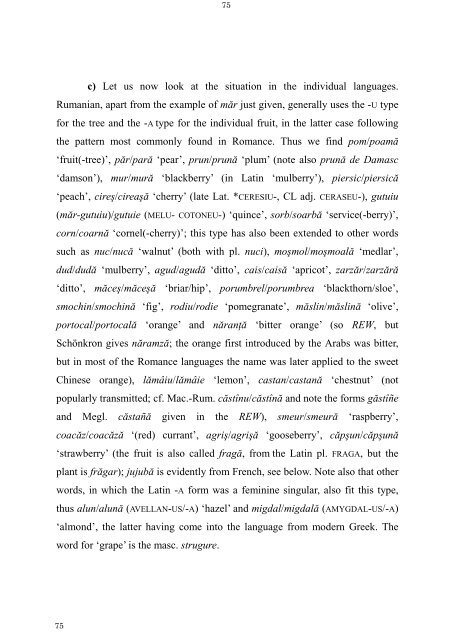The Latin Neuter Plurals in Romance - Page ON
The Latin Neuter Plurals in Romance - Page ON
The Latin Neuter Plurals in Romance - Page ON
You also want an ePaper? Increase the reach of your titles
YUMPU automatically turns print PDFs into web optimized ePapers that Google loves.
75<br />
75<br />
c) Let us now look at the situation <strong>in</strong> the <strong>in</strong>dividual languages.<br />
Rumanian, apart from the example of măr just given, generally uses the -U type<br />
for the tree and the -A type for the <strong>in</strong>dividual fruit, <strong>in</strong> the latter case follow<strong>in</strong>g<br />
the pattern most commonly found <strong>in</strong> <strong>Romance</strong>. Thus we f<strong>in</strong>d pom/poamă<br />
‘fruit(-tree)’, păr/pară ‘pear’, prun/prună ‘plum’ (note also prună de Damasc<br />
‘damson’), mur/mură ‘blackberry’ (<strong>in</strong> <strong>Lat<strong>in</strong></strong> ‘mulberry’), piersic/piersică<br />
‘peach’, cireş/cireaşă ‘cherry’ (late Lat. *CERESIU-, CL adj. CERASEU-), gutuiu<br />
(măr-gutuiu)/gutuie (MELU- COT<strong>ON</strong>EU-) ‘qu<strong>in</strong>ce’, sorb/soarbă ‘service(-berry)’,<br />
corn/coarnă ‘cornel(-cherry)’; this type has also been extended to other words<br />
such as nuc/nucă ‘walnut’ (both with pl. nuci), moşmol/moşmoală ‘medlar’,<br />
dud/dudă ‘mulberry’, agud/agudă ‘ditto’, cais/caisă ‘apricot’, zarzăr/zarzără<br />
‘ditto’, măceş/măceşă ‘briar/hip’, porumbrel/porumbrea ‘blackthorn/sloe’,<br />
smoch<strong>in</strong>/smoch<strong>in</strong>ă ‘fig’, rodiu/rodie ‘pomegranate’, măsl<strong>in</strong>/măsl<strong>in</strong>ă ‘olive’,<br />
portocal/portocală ‘orange’ and năranŃă ‘bitter orange’ (so REW, but<br />
Schönkron gives năramză; the orange first <strong>in</strong>troduced by the Arabs was bitter,<br />
but <strong>in</strong> most of the <strong>Romance</strong> languages the name was later applied to the sweet<br />
Ch<strong>in</strong>ese orange), lămâiu/lămâie ‘lemon’, castan/castană ‘chestnut’ (not<br />
popularly transmitted; cf. Mac.-Rum. căstînu/căstînă and note the forms găstîñe<br />
and Megl. căstañă given <strong>in</strong> the REW), smeur/smeură ‘raspberry’,<br />
coacăz/coacăză ‘(red) currant’, agriş/agrişă ‘gooseberry’, căpşun/căpşună<br />
‘strawberry’ (the fruit is also called fragă, from the <strong>Lat<strong>in</strong></strong> pl. FRAGA, but the<br />
plant is frăgar); jujubă is evidently from French, see below. Note also that other<br />
words, <strong>in</strong> which the <strong>Lat<strong>in</strong></strong> -A form was a fem<strong>in</strong><strong>in</strong>e s<strong>in</strong>gular, also fit this type,<br />
thus alun/alună (AVELLAN-US/-A) ‘hazel’ and migdal/migdală (AMYGDAL-US/-A)<br />
‘almond’, the latter hav<strong>in</strong>g come <strong>in</strong>to the language from modern Greek. <strong>The</strong><br />
word for ‘grape’ is the masc. strugure.









